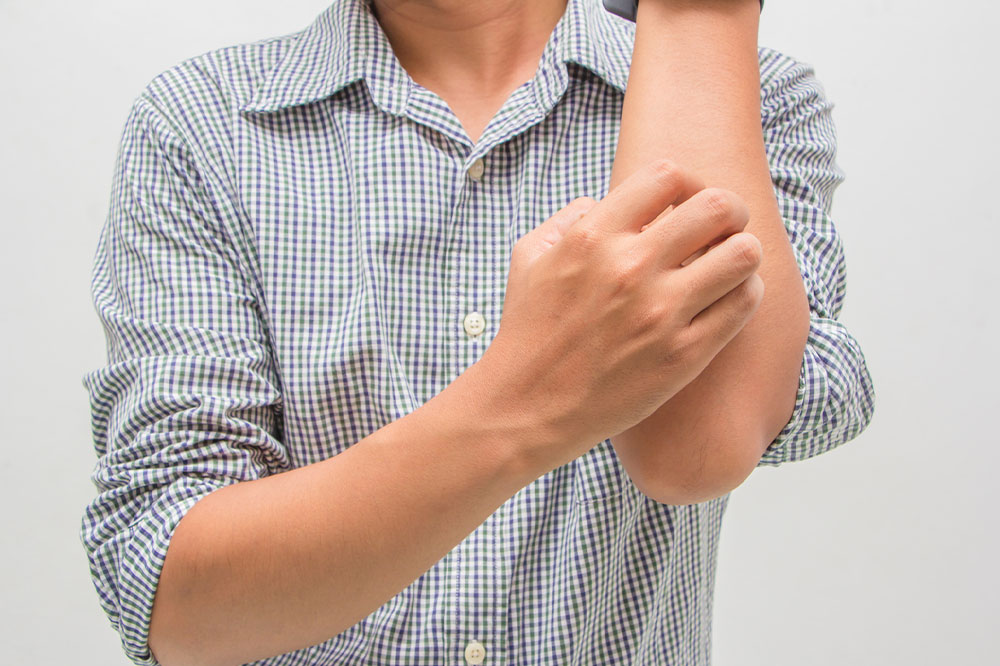Everything to know about eczema

Eczema is an inflammatory skin disease that causes blisters, scaly areas, rashes, and itchy and dry skin. Itchy skin is the most typical symptom of eczema. The seven types of eczema are atopic dermatitis, contact dermatitis, dyshidrotic eczema, nummular eczema, seborrheic dermatitis, and stasis dermatitis. Anyone, at any age, can get eczema. Symptoms typically start in early childhood and persist through adulthood. A thorough diagnosis and personalized treatment plan are the first steps toward relief.
Causes of eczema
Immune system
Your immune system overreacts to minor allergens or irritants (triggers) in your environment if you have eczema. Your immune system interprets minor irritants as dangerous foreign invaders, such as bacteria or viruses, when you come into contact with a trigger. Consequently, the triggers cause your body’s defense mechanisms to go into action. Inflammation is the immune system’s method of protection. Your skin’s eczema symptoms are brought on by inflammation.
Irritants from surroundings
Your surroundings may have many things that can aggravate your chances of developing skin diseases. Examples include breathing in pollutants, using harsh soaps, wearing wool, and using some skin care products. Your skin could feel dry and inflamed in low humidity or dry air. Sweating can be brought on by heat and excessive humidity, which can worsen itching.
Genes
If you have a family history of eczema or dermatitis, you are more likely to develop the condition. Additionally, if you have a history of allergies, hay fever, or asthma, you are at a higher risk. Pollen, pet dander, and foods that cause an allergic reaction are examples of common allergies.
Filaggrin deficiency
Additionally, there may be a hereditary component to eczema. A protein called “filaggrin” helps keep your skin moisturized; a filaggrin deficiency could result in drier, itchier skin. This can raise your likelihood of developing eczema.
Emotional causes
Your skin’s health can also affect your emotional well-being, which could escalate eczema symptoms. If you are under a lot of stress, worry, or depression, your eczema may flare up more frequently.
Symptoms associated with eczema
Atopic dermatitis symptoms may vary depending on an individual’s age, the severity of their condition, and other circumstances. Individuals with the disorder frequently go through phases when their symptoms worsen, followed by phases where they get better or even go away.
Your eczema may not present the same way as another adult’s or a child’s eczema would. Even the affected body sections may have different types of eczema at various periods.
Despite the fact that the two disorders are distinct, some people confuse the symptoms of psoriasis with those of eczema. Numerous eczema-affected people also recount hay fever, allergic asthma, and food allergy-like symptoms. Proper, consistent skin care is crucial to prevent and treat eczema.
Eczema symptoms frequently include:
- Itchiness, dryness, sensitivity, inflammation, and discolored skin
- Skin that is rough, leathery, or scaly and appears in patches
- Crusting or oozing skin
- Swelled areas
- More scaly rashes compared to those that children get
- Rashes that frequently develop in the neck, elbow, or knee creases
- Rashes that cover a larger body portion
- Skin infections
You can experience some or all of these eczema symptoms.
Diagnosis
Eczema is diagnosed by a medical professional after a physical assessment, during which they carefully study your skin. Since eczema is frequently diagnosed in youngsters, as it occurs most frequently among children, a diagnosis can be made at any age if symptoms start to appear. To confirm your diagnosis and rule out other skin diseases, your doctor can suggest tests that can include:
- Test for allergies
- Blood tests to look for other non-dermatitis causes for the rash
- A skin biopsy to differentiate between different types of dermatitis
- A patch test can identify specific allergens that cause symptoms, such as contact dermatitis-related skin allergies. An allergen is applied to a patch and placed on the skin during a patch test. Your skin will itch and inflame if the allergen triggers your eczema type.
Management options
At present, eczema has no known treatment. Healing the afflicted skin area and avoiding symptom flare-ups are the treatment goals for this disorder. These include:
- When you have dry skin, use light or sensitive skin moisturizers all day long
- moisturize your skin when it is still damp from a bath or shower
- As directed by your doctor, apply topical drugs such as topical steroids to your skin.
- To lessen itching and swelling, take oral treatments such as anti-inflammatory drugs, antihistamines, or corticosteroids
- Immunosuppressive medications aid in controlling the way your immune system works
- Light therapy to clear up blemishes and enhance the appearance of your skin
- Avoid anything that can cause skin disease triggers to flare up.
Medications
Topical creams and ointments
These anti-inflammatory drugs should alleviate the primary signs and symptoms of eczema, such as swelling and itching. They can be directly applied to the affected skin. Medication with a prescribed strength may be advantageous for some persons.
Topical calcineurin inhibitor
The immune system’s activity is decreased by this medicine. It reduces inflammation and helps avoid flare-ups.
Barrier repair moisturizers
This helps to heal the skin and stop water loss.
Antibiotics
If eczema coexists with a bacterial skin infection, doctors will prescribe antibiotics.
Antihistamines
Given their propensity to make people sleepy, these medications can lower the likelihood of midnight scratching.
Oral drugs
If topical therapies are ineffective, a doctor may prescribe oral drugs such as immunosuppressants. They should be used only for brief periods. It is also vital to remember that if a person is not currently taking another prescription for skin diseases, the symptoms may worsen after stopping them.
Biologic pharmaceuticals that are injected
These treatments stop immune system reactions by limiting immune system responses.
Phototherapy
This procedure exposes the patient to UVA or UVB rays. Mild dermatitis can be treated with this technique. The doctor will keep a constant eye on the skin throughout the course of treatment.









